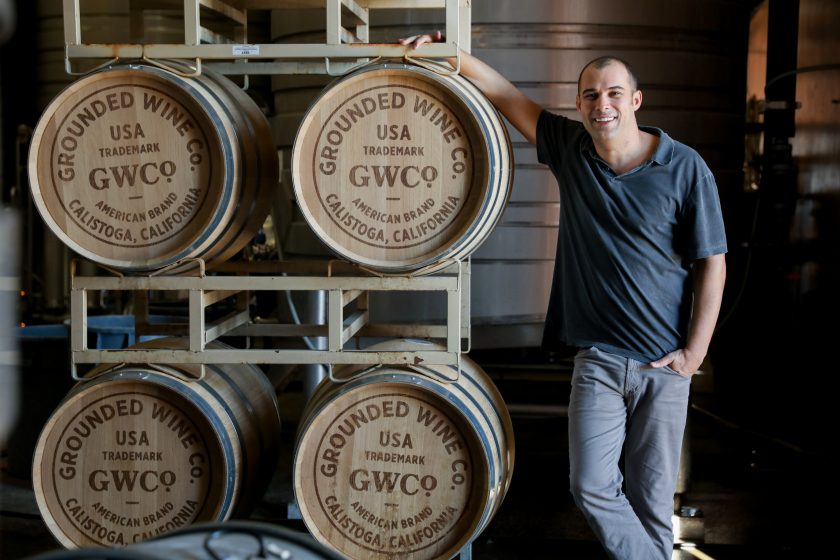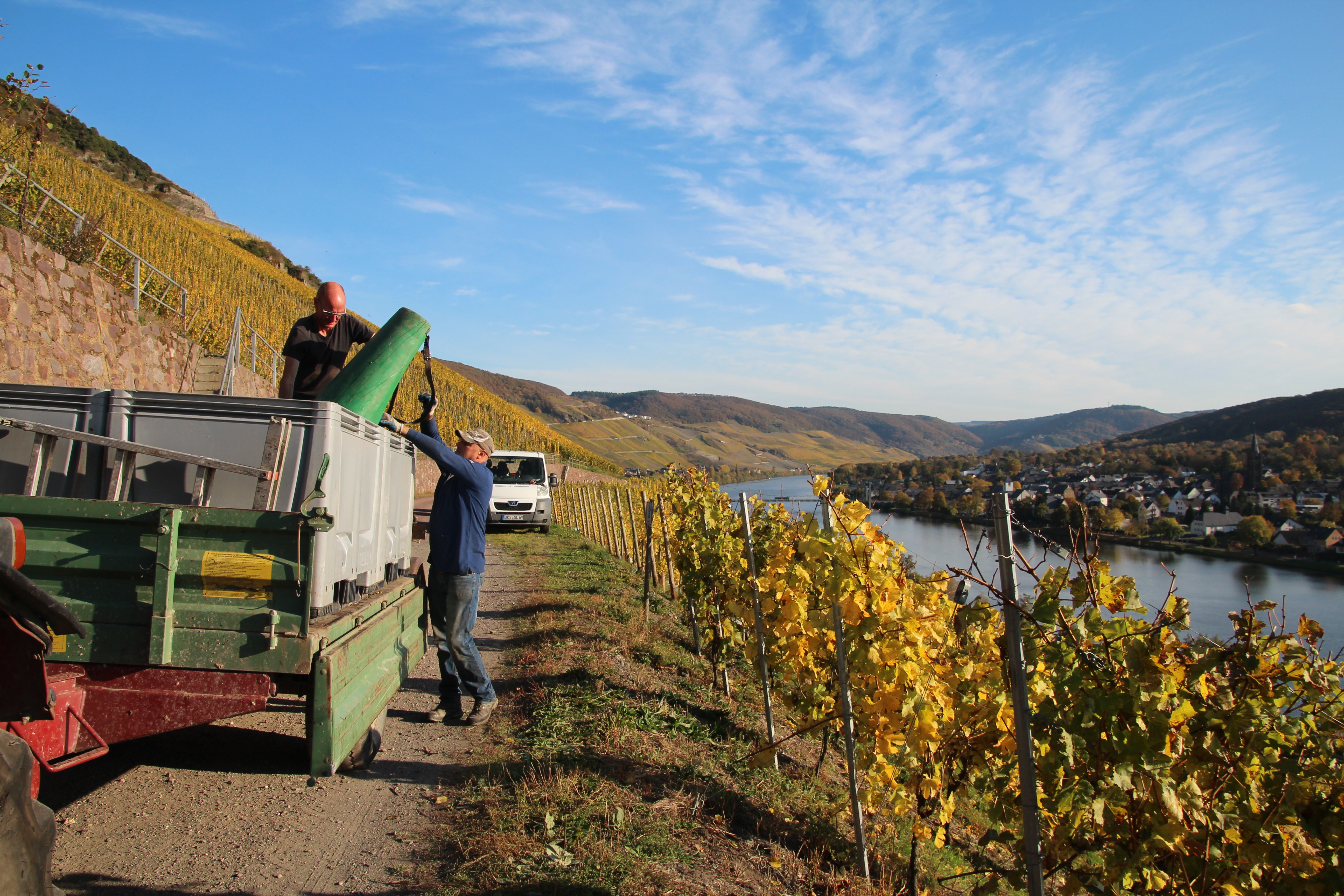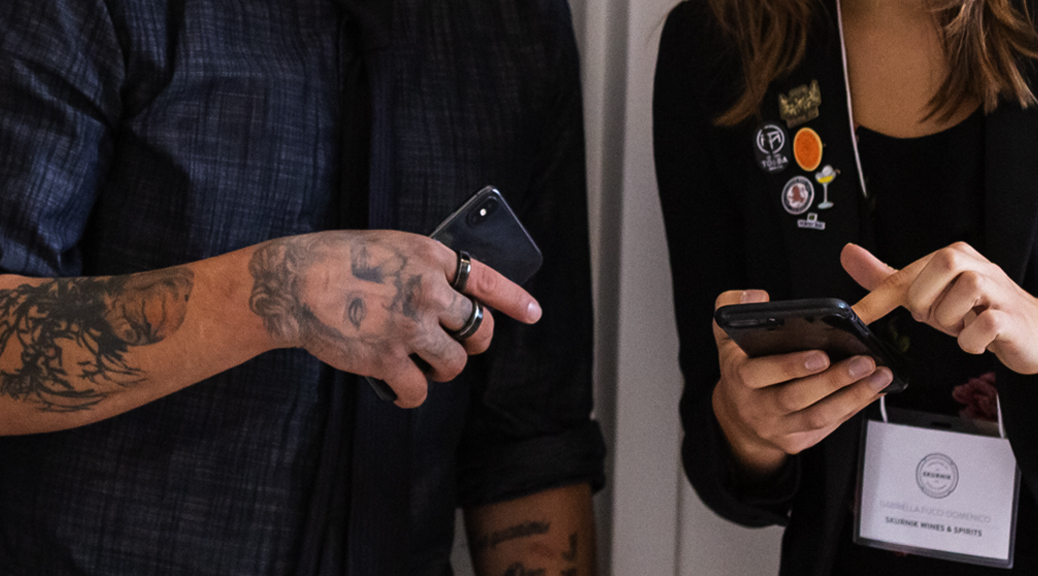Above: Josh Phelps of Grounded Wine Co.
Working with trusted farmers and childhood friends, Grounded Wine Co. reflects Napa native Josh Phelps’ deep understanding of wine, one that can only be achieved from growing up around the vines.
Josh’s roots run deep; he was raised in a winemaking family and exposed to the industry from a young age. He continued to build his knowledge of the business through college— selling wine, working harvests, and making wine for friends with his father, Chris Phelps, before starting his first winemaking business straight out of school.
After building his first successful wine brand in his 20s, and further establishing his foundation of contacts and knowledge in the industry, Josh moved to his next (and now current) project, Grounded Wine Co., with the ambition to reflect his own experiences growing up in wine country, and his relationships in the wine community.
Over the past four years, Josh has developed a really excellent lineup of value-driven wines from Washington, Oregon, and predominantly California. Today, he’s succeeded in delivering high-quality, accessible, and approachable wines, all with the ambition to provide as much value as possible in the bottle.
We sat down with Josh to talk about his Napa roots, winemaking philosophy, and what sets his wines apart!
TALK TO US ABOUT GROWING UP IN A WINEMAKING FAMILY.
So my dad went to U.C. Davis, and then the University of Bordeaux to get his Master’s in winemaking. And during that time, he got a job working at Petrus, which led him to get to know Christian Moueix, and later become the founding winemaker of
Dominus Estate. I remember him working at Dominus when I was a kid, and then he worked for a series of other Napa wineries as I was growing up.
I grew up around wine, mostly Cabernet from both California, but also around a bit of Bordeaux. My dad’s approach to Cabernet Sauvignon in Napa has always been a little bit more old school and Bordeaux-inspired given his education and work there.
I wasn’t super fascinated with wine as a kid… but in my late teens, early twenties, and when I was in college, I started to grasp the business and decide that it was something I was interested in. Still, I understood winemaking from a pretty young age from helping and being around the cellar to learn the process with my dad. And even though I was introduced to winemaking through my dad, he didn’t pressure me to get into wine.
I remember when I was 21, we went to Bordeaux as a family for the holidays one year. That was interesting for me – seeing the wine business from outside of Napa. My dad has friends over there, so we were able to see some wineries, and it helped me understand the wine business some more, as an outsider; the wine world became more and more appealing and made me wonder if this was something that I wanted to do.
WERE THERE ANY OTHER PIVOTAL EXPERIENCES THAT REALLY MADE WINEMAKING ‘CLICK’ FOR YOU?
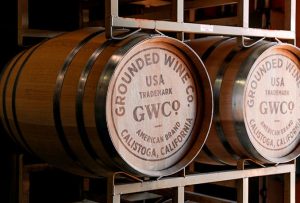
For my senior project in college, I created a wine brand that we eventually turned into a business after graduation, so I just dove into it. In addition to my dad, I’ve had some impactful mentors like the late Leslie Rudd, Joel Gott, some folks that I’ve worked with over the past decade and have been able to call on as mentors.
So I had this first brand for seven years and it grew quite rapidly. And then I moved on to start Grounded, where I was focused on putting exactly what I wanted in the bottle, so that I could stand behind the quality in a bigger way.
When I first came to Skurnik, I had the Napa Cab and the Washington Cab, two brands that are a bit smaller for us now. And thankfully, I think the family saw something in what we wanted to develop. It’s taken a few years, but we have a real grasp on what we want to do into the future, which is to focus on delivering the best possible expressions of wines from Napa, Washington, and Oregon, at an affordable and accessible price point.
WHAT’S IT LIKE WORKING WITH YOUR DAD TODAY?
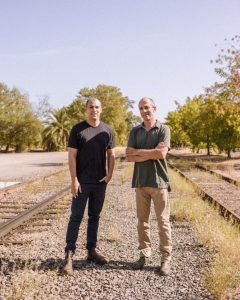
Today, my dad is a consulting winemaker and is really the Director of Winemaking. I’m focused on the day-to-day winemaking operations, but he’s really overseeing as an expert in blending and sourcing. We’re making wines that I think are pure, honest, and authentic; wines that are correct, which isn’t always the case at the price points that we’re at.
And, I think he really enjoys it. We share an office now, and I think it’s interesting because his career started and has always been rooted in high-end winemaking so I don’t know if he would have ever considered making Rosé or wine seltzers. It’s fun!
He has his own brand and makes a single-vineyard Cabernet – it’s an amazing wine, right, but it comes from one vineyard so it’s pretty straightforward. With the Grounded Cabernet, there are so many fruit sources, and so many lots, so it’s not as straightforward, it’s more of a process. I think he enjoys that and his high-end expertise is this tremendous value-add as we’re trying to create the best possible wine that’s still on the affordable side. We have real expertise making $15 California Cabernet, which, to me, is a tremendous value.
WHO ARE YOU MAKING WINE FOR?
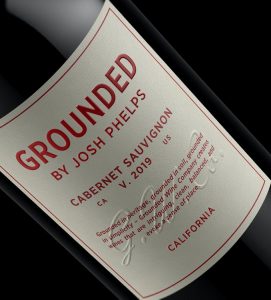
When I got into the business, with my last company, I was thinking mostly about making wine for millennials. And of course, a broader range of people were into the wines. I’m making these wines that are 15 bucks that are high quality; they’re varietally-correct, authentic, classic wines.
The packaging is a big piece of the puzzle, for me; we want the consumer to gravitate towards it. On the California wines, I’ve tried to kind of embrace in a sense classic packaging, but with a modern edge to appeal to the younger generations. So, if you’re looking at a lineup, our label just looks a little edgier, a little cooler, fresher than the others, and hopefully, once you’ve tasted the wine, you start to embrace the brand.
While I like to embrace millennials, I’m not disregarding my parent’s generation, who are happily buying the wines as well. Ultimately, I don’t want the product to feel stale. So you kind of go out with a mission, but you see where it goes. It’s tricky to like point to one demographic, but I do think that it’s important that we capture the younger audience.
With my dad’s wine that’s 175 bucks a bottle, we’re constantly getting it in front of younger consumers every year, because it’s important to keep the energy behind any brand. Any brand has to find ways to stay relevant and engage younger audiences.
WHAT DOES THE CHECKLIST LOOK LIKE FOR PEOPLE YOU SOURCE FRUIT FROM?
The best way to talk about the kind of fruit sourcing we do is through the
California Cabernet and
Sauvignon Blanc, because that’s where it’s the most broad. We started with those wines, because we have so many contacts throughout the state of California – a portfolio of people and vineyards to work with.
And by next year, everything’s going to be certified sustainable, which we’re really proud of. Our winemaking and production partners have helped us get there. Our overall philosophy is just to aim for the highest quality, to work with people who we want to work with, and to do what’s right. We want to work with organic and sustainable vineyards wherever possible, and so hopefully as we continue to grow and people’s farming practices continue to improve. Organic practices are more relevant to us, too, and that’s something we’re trying to take into account as we’re sourcing.
We know all of the growers we work with really well, we know what we’re looking for, and that’s a big piece as we grow – making sure that we’re maintaining quality.
WHAT SETS YOUR CABERNET SAUVIGNON APART IN THE CURRENT LANDSCAPE FOR NAPA CAB?
It’s interesting because growing up in Napa, obviously, it’s Cabernet country, and we have our
California Cabernet, which is much less expensive, and we do have our
Steady State, which is our Napa Cabernet. I love Cabernet Sauvignon from Napa; there’s a list of producers that I love and that I collect and I think are doing a spectacular job, a handful of which you guys represent. There’s also an ocean of generic Napa Cabernet, and these new, fancy brands, which aren’t really exciting to me. From a quality and style standpoint, it’s saturated the market a bit and kind of makes us forget how great Napa Cab can be.
I was fortunate to grow up drinking a lot of Dominus, which to me is a benchmark Cabernet producer here in Napa. When I set out to make a Napa Cab and this portfolio, I wanted it to be accessible. So, $50 retail is, I think, value in Napa. We work with a handful of growers, all Valley Floor in Oakville, Yountville, and Napa proper. I have an investor now who has a vineyard in Oak Knoll, so that’s kind of our home vineyard, we farm that.
And, as a result, I think, being that the vineyards are all Valley Floor, we’re making a bit more of a classic style Napa Cab. Steady State isn’t this overbearing oak bomb-style wine. It’s going to be more of a restrained Cabernet, especially for that price point. My intent with that wine is to make something that’s a nod to the past; it’s very palatable, it’s a well-made, well-balanced wine that’s not 150 bucks, or 200 bucks, it’s $50.
So that’s what we’re trying to do in Napa with Grounded. It’s small, but we’re really proud of the product, and I think we’re creating some value in a region where that’s difficult.
TELL US ABOUT WASHINGTON AND OREGON. WHAT DREW YOU IN THERE?
I was intrigued by both of these regions, but we went to Washington first, and I was really interested in the wine there from a value perspective – the value that a winemaker like Charles Smith was delivering up there. I think that Eastern Washington, Red Mountain, and Seven Hills… those regions are really great for Cabernet. There’s just a freshness to the wines, you can make a $20 wine that’s really great. So it was kind of a new frontier to explore. I decided that we were going to make a little wine up there and, like anything, it stemmed from some friendships.
So we started producing wine there in 2016, under the Grounded label. And then we built out Collusion as a nod to the Prohibition Era. That brand still hasn’t hit 5,000 cases. It’s not anything huge, but I think it’s really varietally-correct Cabernet Sauvignon— there’s this Malbec component— I love the Malbec up there. It’s really a pure, honest wine that has created a nice little niche for itself.
And then with Oregon, I really just love Pinot Noir from Oregon. I have a good friend, Nicolas Keeler who has a brand called Authentique up there, but has family has a winery called Keeler Estate. And when I had Taken Wine Company, I think it was my final harvest with the company, I was kind of fatigued on what I was doing and I managed to shoot up there during harvest that year for a week and just helped him at his winery. I think I walked away with some fruit contracts because I really just loved everything that was going on up there— both Pinot Noir and Chardonnay— there’s some really cool stuff happening. To me, it’s a more similar terroir to Burgundy than anything we have in California.
The wine that we’re making, Landform, the one wine we make up there, has this cru Beaujolais-like quality because it’s fresh, it’s fruit-forward. We’re striving for that to be all organic fruit. That’s all native yeast fermentation and open-top containers, and then we’re aging in neutral French Oak barrels, so there’s really no oak impact. It’s bright, fruit-forward, and fresh. That’s been a fun little project. We haven’t put much marketing behind it at all, it’s kind of done its thing and seems to be working, so now we’re in a position where we’re starting to grow the brand a bit. Landform is often a go-to for me just to enjoy.
WHAT’S THE LINE OF CONTINUITY IN WORKING IN THREE DIFFERENT PLACES: CALIFORNIA, WASHINGTON, & OREGON?
I think if you sit down and taste all the wines, there’s a definite style that runs through all of them. Everything is clean, it’s pure, it’s well-made, and balanced. You can see that common thread from the $50 wines, to the $25 wines, to the $15 wines.
I did a virtual tasting with a major retail partner in Minneapolis and it was interesting because this was the first time this particular buyer had tasted the full lineup together. She commented on the common thread between the wines from a quality standpoint, and also from a style standpoint. You can tell the Cab is from Washington, you can tell the Pinot Noir is from Oregon. We know that that’s not always the case. The wines are clean, balanced, pure wines of place that are not manipulated in any way.
THE WINES
Public Radio Red Wine ‘Paso Robles’, Grounded Wine Co.
Practicing Sustainable • 90% Grenache, 10% Syrah • Sourced exclusively from select vineyard blocks in the westside region of Paso Robles AVA • Fermented in open-top tanks • Aged 16 months in French oak puncheons (20% new) • 1,500 cases produced • 14.1% abv
‘Space Age’ Rosé, Grounded Wine Co.
Practicing Sustainable • Primarily Grenache with some Counoise, Carignan, Syrah and Grenache Blanc • Sourced from carefully selected vineyards across Santa Barbara County • Whole cluster press, followed by slow, cold fermentation in tank
WE:90 A lovely shade of pink, this rosé booms on the nose with strawberry and raspberry-sorbet aromas that are cut by a citrusy edge. The acidity is bold on the palate, slicing through the ripe stone-fruit and cherry flavors, as tangerine pith provides a counterpoint.
Cabernet Sauvignon ‘California’, GROUNDED by Josh Phelps
Practicing Sustainable • 90% Cabernet Sauvignon, 10% Merlot • Cabernet is sourced from North and Central Coast Vineyards and the Merlot is sourced from Rutherford AVA in Napa Valley • 14.1% abv
WE:90 Offering outstanding value, this wine contains nearly one quarter of Merlot, helping to soften and broaden the palate. Cherry candy, clove and black pepper adorn a balanced texture complemented by dried herb and cedar, finishing dry and immensely approachable. VIRGINIE BOONE
Sauvignon Blanc ‘California’, GROUNDED by Josh Phelps
Practicing Sustainable • 100% Sauvignon Blanc • Sourced from small carefully selected vineyards in Monterey and Central Coast regions • 4,000 cases produced • 13.9% abv
WE:90 Lifted and flinty, this crisp white is layered in flavors of white peach and pomelo, with lasting freshness. It’s a great value and delivers tremendous sophistication. VIRGINIE BOONE
Cabernet Sauvignon ‘Steady State – Napa Valley’, Grounded Wine Co.
Practicing Sustainable • 86% Cabernet Sauvignon, 10% Petit Verdot, 3% Cabernet Franc, .5% Malbec, .5% Merlot • Sourced from Oak Knoll, Oakville (adjacent to Silver Oak), Rutherford, and St. Helena (near Beckstoffer’s Dr. Crane vineyard) • Volcanic soils • Hand-harvested • Aged 18 months in 100% French oak barrels (40% new)











